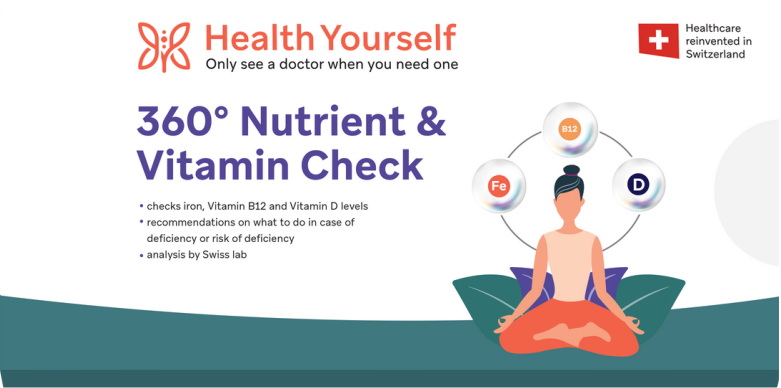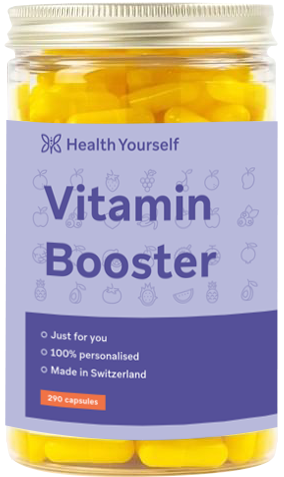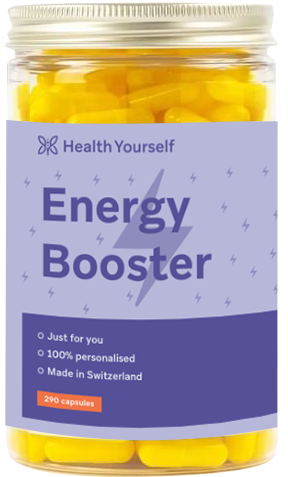Check your vitamin & nutrient health from home.
Chose your test, take your sample from home and get your results online 2-3 days later.
360° Vitamin & Nutrient Check
Check all most important vitamins & nutrients in one go.

If you have a supplementary health insurance policy with CSS, you can now get 50% of your test costs covered by insurance.
This is how it works:
1. Click on the link below to go to the CSS webshop "enjoy365".
2. Explore, which tests are currently offered. At the moment, it is the 360° Fatigue Check and the 360° Vitamin Check. The offering changes every few months.
3. Order your test at 50% of the price.
Test parameters
Iron has lots of functions in our body.
On the one hand, it is necessary for creating hemoglobin which is in turn responsible for transporting oxygen through our body). Beyond that, it is necessary for synthesising several enzymes and proteins which not only contribute to our immune system and our brain functioning well, but are also important for good physical performance.
The two major risk factors for developing an iron deficiency:
1. Being a woman from the moment you get your first period - and start losing quite a bit of iron with each of those periods - to the moment when you stop menstruating
2. Not taking in enough iron through your food, which is often the case for vegans and vegetarians
A less common reason for iron deficiency is that your body needs more iron than normal which is the case during pregnancy or for elite athletes.
In some cases, your body might also have issues with absorbing iron you take in through your food. This can be caused by specific medications like PPIs or medical conditions like chronic gastritits.
Iron deficiency can cause a whole lot of not-so-awesome symptoms like:
- headache
- diminished cognitive function
- fatigue - that means always being tired
- depression
- impaired memory
- diminished exercise tolerance
- muscle and joint pain
- weight gain
Step 1: If you have an iron deficiency, a doctor will first rule out any serious health conditions which might be causing your iron deficiency.
Step 2: If things are all good on that front, an iron deficiency is treated with supplements. Supplements can be taken in the form of pills or, especially if you have a severe iron deficiency, your doctor might prescribe you an iron drip.
Important when taking supplements: Avoid drinking tea or coffee 2 hours before and after taking your supplement since both drinks negatively impact the absorbtion of iron. Better have some vitamin C - for example a glass of orange juice - which improves absorption in your body.
Step 3: Beyond that, you might want to get some dietary advice to up your iron intake with your daily food. That is also a good way to prevent iron deficiency in the future.
The best way to prevent iron deficiency is to
- test regularly
- and to fix the root cause of your iron deficiency - which is mostly a lack of iron in your diet.
By testing regularly, you can track, if you ferritin value - which is measured to determine your iron status - is sinking or might even already put you in a deficiency risk zone.
If you know this, you can avoid developing an iron deficiency by increasing your iron intake or taking supplements before you get into a deficiency zone.
Vitamin B12 has various jobs in our body.
For example, it is necessary for:
- DNA synthesis
- maintenance of myelin sheaths (very important for our nerves to function properly)
- synthesis of neurotransmitters
- blood cell production
- overall brain health
Humans take in vitamin B12 by eating animal products like meat, fish and milk products.
Important to know: there is no 'natural' occurence of vitamin B12 plants.
Therefore, vegans and vegetarians are at a high risk of Vitamin B12 deficiency unless they take supplements.
Common symptoms of vitamin B12 deficiency include
- tingling in the hands and feet
- problems with balance
- confusion
- dementia
- weakness
- loss of appetite
- anemia
Vitamin B12 is only found in animal products such as meat, fish and milk.
Therefore, if you are vegetarian or even vegan, you are very likely to not take in enough vitamin B12 through your diet.
Other causes can be issues with absorption of vitamin B12 in your intestines due to gastrointestinal diseases like Morbus Crohn, medication such as PPI, H2-receptor blockers or if you had gastric bypass surgery.
Vitamin B12 deficiency is treated by "re-filling" your vitamin B12 stores through supplements or vitamin B12 injections. If you are willing to eat animal products, you can also adjust your diet to increase you vitamin B12 intake on a daily basis. A nutritionist can help you with that!
The best way to prevent iron deficiency is to
- test regularly
- and to fix the root cause of your iron deficiency - which is mostly a lack of iron in your diet.
By testing regularly, you can track, if you ferritin value - which is measured to determine your iron status - is sinking or might even already put you in a deficiency risk zone.
If you know this, you can avoid developing an iron deficiency by increasing your iron intake or taking supplements before you get into a deficiency zone.
The recommended daily intake of vitamin B12 is between 4 and 7 mcg.
But how do you manage that? Content of Vitamin B12 varies but is generally found in animal products such as meat, fish and milk products. According to US department of agriculture, for example:
- one egg has about 1.1 mcg
- 100 g of 1% fat milk have 0.5 mcg
- 100g meat have 0.6 mcg
- 100 g Atlantic salmon, cooked has about 2.8mcg / 100g
If you are super committed: liver is your best bet to get enough Vitamin B12 with about 18.7 mcg / 100g !
Vitamin D has multiple functions in your body.
It is is not only essential for keeping your bones strong and healthy, but also plays a role in regulating muscle contractions and keeping your immune system working well.
The major cause of Vitamin D deficiency is not getting enough sun: Our body needs UV light from sun rays to produce Vitamin D.
If we don´t get enough of that light, no Vitamin D for you.
In Central Europe, we basically never get enough sun during the winter, because from October to March, the local UV-Index is too low for our body to be able to use it to synthesise Vitamin D.
If you on top of that spend a lot of your time indoors or only go out with sun protection like clothes, hats and sun screen, you have an even higher risk of getting a Vitamin D deficiency.
Common symptoms of vitamin D deficiency range from always being tired and feeling low or depressed to issues with the structural integrity of your bones, being susceptible to infectious diseases - noone wants that in the middle of a pandemic! - or even having problems with fertility.
The natural way to treat your Vitamin D deficiency, is to get more sun exposure to your body can create enough Vitamin D (you remember, no sunshine, no Vitamin D production).
The best way to do that, is to spend 15-20 minutes in direct sunlight 2-3 times per week without covering your head and ideally your upper body and without sun screen. Emphasis is on 15-20 minutes (!) - otherwise you are at risk of sunburn, skin cancer and all those not so nice things.
Beyond that, you can also take Vitamin D supplements to replenish your Vitamin D levels. Most commonly, that is done with drops.
Most important thing about Vitamin D: your body cannot produce it if you do not get enough sunlight. So the best way to avoid Vitamin D deficiency, is to make sure, that you get enough sun exposure.
During the summer, recommendation is to spend 15-20 minutes in direct sunlight 2-3 times per week without covering your head and ideally your upper body and without sun screen. Emphasis is on 15-20 minutes (!) - otherwise you are at risk of sunburn, skin cancer and all those not so nice things.
However, in Central European countries like Switzerland, from about October to March, the sun is not strong enough for your body to be able to use it to produce Vitamin D. So during winter, it might be necessary to take Vitamin D supplements. We recommend to get tested in the fall to check if your Vitamin D levels are already low and incorporate supplements into your routine if that is the case.
Individual tests
Of course, you can also test for vitamins & nutrients individually.
Personalised supplements
Personalised supplements
Vitamin Booster


Commonly asked questions and answers about this test.
How quickly will I receive my test?
From Monday to Friday, all orders submitted before 16:00 are shipped on the same day and will usually arrive on the next working day including Saturday. All tests ordered over the weekend are shipped on Monday and usually arrive on Tuesday.
How will my test be delivered?
All tests are delivered by Swiss Post in envelopes or parcels without any outside markings.
Will I be able to take my sample correctly without any medical training?
You do not require any medical training to use our tests. We provide very detailed instructions on how to take your sample and several thousand customers have already successfully taken their tests.
How do I return my sample to the lab for analysis?
You simply put your sample into the return box we provide with each test kit and drop the return box off in any Swiss Post mailbox. You do not need to add a stamp, this is already printed on the return box.
Who analyses my sample?
Your sample is analysed by our laboratory partner Medisyn (formerly known as Synlab). Medisyn is one of the largest laboratory service providers in Switzerland. You might have encountered them during COVID.
Are the results as reliable as from a doctor's office?
All analyses included in this test are also offered through doctors' offices by our laboratory partner Medisyn (formerly known as Synlab). You effectively receive the same test, you only collect the sample from home instead of at the doctor's office.
Medisyn is the largest provider of laboratory services in Switzerland and uses state-of-the-art technology for analysis of all samples.
How long does it take to receive my results?
Your results are generally available online 2-3 working days after you have sent your sample to the lab for analysis.
Will I be able to understand my results without any medical training?
All tests results are easily understandable without any medical training and include clear explanations.
What if my results show a value outside of the normal range?
In case your test results indicate a vitamin or nutrient deficiency, you can immediately order your personalised supplement based on your test results to address the issue.



